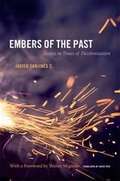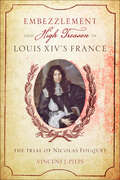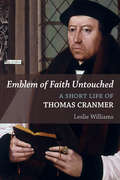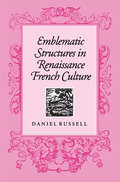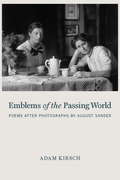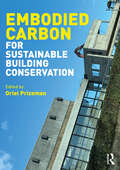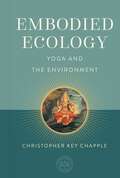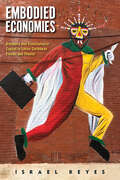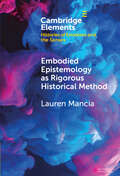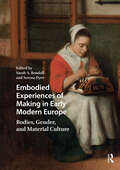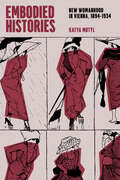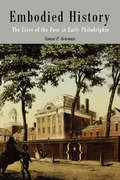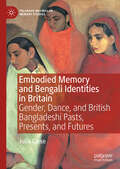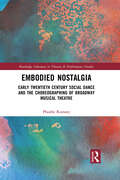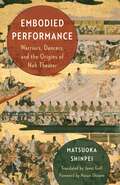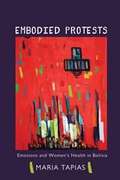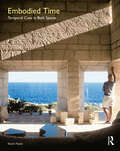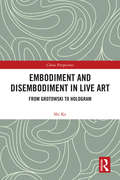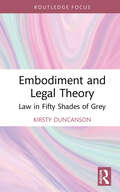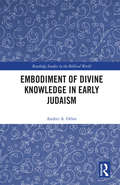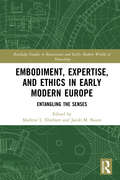- Table View
- List View
Embers of the Past: Essays in Times of Decolonization
by Javier Sanjines C. David Sanjinés C.Embers of the Past is a powerful critique of historicism and modernity. Javier Sanjinés C. analyzes the conflict between the cultures and movements of indigenous peoples and attention to the modern nation-state in its contemporary Latin American manifestations. He contends that indigenous movements have introduced doubt into the linear course of modernity, reopening the gap between the symbolic and the real. Addressing this rupture, Sanjines argues that scholars must rethink their temporal categories. Toward that end, he engages with recent events in Latin America, particularly in Bolivia, and with Latin American intellectuals, as well as European thinkers disenchanted with modernity. Sanjinés dissects the concepts of the homogeneous nation and linear time, and insists on the need to reclaim the indigenous subjectivities still labeled "premodern" and excluded from the production, distribution, and organization of knowledge.
Embezzlement and High Treason Louis XIV's France: The Trial of Nicolas Fouquet
by Vincent J. PittsA look at life in the court of King Louis XIV, the politics of the time, and the trial of a man who knew too much for his own good.From 1661 to 1664, France was mesmerized by the arrest and trial of Nicolas Fouquet, the country’s superintendent of finance. Prosecuted on trumped-up charges of embezzlement, mismanagement of funds, and high treason, Fouquet managed to exonerate himself from all the major charges over the course of three long years, in the process embarrassing and infuriating Louis XIV. The young king overturned the court’s decision and sentenced Fouquet to lifelong imprisonment in a remote fortress in the Alps.A dramatic critique of absolute monarchy in pre-revolutionary France, Embezzlement and High Treason in Louis XIV’s France tells the gripping tale of an overly ambitious man who rose rapidly in the state hierarchy—then overreached. Vincent J. Pitts uses the trial as a lens through which to explore the inner workings of the court of Louis XIV, who rightly feared that Fouquet would expose the tawdry financial dealings of the king’s late mentor and prime minister, Cardinal Mazarin.“A compelling account of a political drama in mid-seventeenth century France, but it is also a window into the process by which rule of law gradually became established . . . [and] I thoroughly enjoyed reading it.” —EH.Net“Pitts’s book examines the show trial of Fouquet, and…the political process that created such an unfair outcome for a man who is often seen as one of the most well-known scapegoats in French history. Pitts has succeeded masterfully in weaving a powerful narrative that exposes convoluted corruption and mismanagement of ancient régime France.” —Renaissance Quarterly
Embezzlement and High Treason in Louis XIV's France: The Trial of Nicolas Fouquet
by Vincent J. PittsLouis XIV’s vendetta against his disgraced finance minister exposed dark truths about the state's finances.From 1661 to 1664, France was mesmerized by the arrest and trial of Nicolas Fouquet, the country’s superintendent of finance. Prosecuted on trumped-up charges of embezzlement, mismanagement of funds, and high treason, Fouquet managed to exonerate himself from all of the major charges over the course of three long years, in the process embarrassing and infuriating Louis XIV. The young king overturned the court’s decision and sentenced Fouquet to lifelong imprisonment in a remote fortress in the Alps.A dramatic critique of absolute monarchy in pre-revolutionary France, Embezzlement and High Treason in Louis XIV's France tells the gripping tale of an overly ambitious man who rose rapidly in the state hierarchy—then overreached. Vincent J. Pitts uses the trial as a lens through which to explore the inner workings of the court of Louis XIV, who rightly feared that Fouquet would expose the tawdry financial dealings of the king's late mentor and prime minister, Cardinal Mazarin.
Emblem of Faith Untouched: A Short Life of Thomas Cranmer (Library of Religious Biography (LRB))
by Leslie Winfield WilliamsRelates one of the most remarkable lives in the tumultuous English Reformation Thomas Cranmer (1489–1556) was the first Anglican Archbishop of Canterbury, the author of the Book of Common Prayer, and a central figure in the English Protestant Reformation. Few theologians have led such an eventful life: Cranmer helped Henry VIII break with the pope, pressed his vision of the Reformation through the reign of Edward VI, was forced to recant under Queen Mary, and then dramatically withdrew his recantations before being burned alive. This lively biography by Leslie Williams narrates Cranmer's life from the beginning, through his education and history with the monarchy, to his ecclesiastical trials and eventual martyrdom. Williams portrays Cranmer's ongoing struggle to reconcile his two central loyalties—allegiance to the crown and fidelity to the Reformation faith—as she tells his fascinating life story.
Emblem of Faith Untouched: A Short Life of Thomas Cranmer (Library of Religious Biography (LRB))
by Leslie Winfield WilliamsRelates one of the most remarkable lives in the tumultuous English Reformation Thomas Cranmer (1489–1556) was the first Anglican Archbishop of Canterbury, the author of the Book of Common Prayer, and a central figure in the English Protestant Reformation. Few theologians have led such an eventful life: Cranmer helped Henry VIII break with the pope, pressed his vision of the Reformation through the reign of Edward VI, was forced to recant under Queen Mary, and then dramatically withdrew his recantations before being burned alive. This lively biography by Leslie Williams narrates Cranmer's life from the beginning, through his education and history with the monarchy, to his ecclesiastical trials and eventual martyrdom. Williams portrays Cranmer's ongoing struggle to reconcile his two central loyalties—allegiance to the crown and fidelity to the Reformation faith—as she tells his fascinating life story.
Emblemata Hispanica: An Annotated Bibliography of Spanish Emblem Literature to the Year 1700
by Pedro F. CampaEmblem books--books containing pictorial representations whose symbolic meaning is expressed in words--were produced in great quantities and in numerous languages during the sixteenth and seventeenth centuries. Because literary critics and art historians increasingly recognize the importance of the emblem in Renaissance and Baroque studies, this book answers the need for a bibliography listing the locations of all known emblem books in Spanish, as well as those translated into Spanish, written by Spaniards in other languages, and polyglot editions that contain a Spanish text.Covered in this bibliography are all emblem books published from the beginning to the end of the Spanish Golden Age, as well as a wide range of secondary sources on relevant subjects, among them mythography, paradoxography, numismatics, fetes, funerals, proverbs, apothegms, antiquarianism, collecting, and pertinent studies in art history and architecture. Providing call numbers for library locations, information on facsimile reprints, and microform editions, the work is extensively indexed--by date and place of publication, by printers and booksellers, by authors and artists, and by dedicatees, as well as by subject.
Emblematic Structures in Renaissance French Culture
by Daniel RussellThe emblem and the device (or impresa as it was called in Italy) were the most direct and telling manifestations of a mentality that played a significant role in the discourse and art in Western Europe between the late Middle Ages and the mid-eighteenth century. In the history of Western symbolism, the emblematic sign forms a bridge between late medieval allegory and the Romantic metaphor. These intricate combinations of picture and text, where the picture completes the ellipses of an epigrammatic text, and where the text fixes the intention of the pictured signs, provide useful clues to the way pictures in general were read and textual descriptions visualized in early modern Europe.Daniel Russell demonstrates how the emblematic forms emerged from the way illustrations were used in late medieval French manuscript culture, how the forms were later disseminated in France, and how they functioned within early modern French culture and society. He also attempts to show how the guiding principles behind the composition of emblems influenced the production of courtly decoration, ceremony, and propaganda, as well as the composition of literary texts as different as Maurice Sc¦ve's Delie, Montaigne's Essais, and Du Bartas's Sepmaine.
Emblems of the Passing World
by Adam KirschAugust Sander's photographic portraits of ordinary people in Weimar Germany inspire this uncanny new collection of poems by one of America's most celebrated writers and criticsThrough his portraits of ordinary people--soldiers, housewives, children, peasants, and city dwellers--August Sander, the German photographer whose work chronicled the extreme tensions and transitions of the twentieth century, captured a moment in history whose consequences he himself couldn't have predicted. Using these photographs as a lens, Adam Kirsch's poems connect the legacy of the First World War with the turmoil of the Weimar Republic with moving immediacy and meditative insight, and foreshadow the Nazi era. Kirsch writes both urgently and poignantly about these photographs, creating a unique dialogue of word and image that will speak to all readers interested in history, past and present.
Embodied Carbon for Sustainable Building Conservation
by Oriel PrizemanThis timely volume provides the latest research, guidance, examples, and methods for understanding, calculating, leveraging, and reducing embodied carbon in building conservation. In the context of climate change and increasing energy costs, imperatives to replace or substantially modify older and historic buildings are rapidly accelerating. The idea that a new or replacement building will perform better overlooks the embodied carbon of that which it replaces. In effect, the pressures of one conservation agenda, that of energy efficiency, threaten to eclipse another, that of heritage. The embodied carbon of existing buildings must be addressed if calculations of operational energy use are to be properly balanced.In this book, an international and multi-disciplinary group of authors offer perspectives on the influence and implementation of strategies to account for embodied carbon for the conservation of the historic environment. Examples are deliberately diverse and extend beyond buildings to the valorisation of a heritage grassland landscape specifically because of its capacity to store carbon, to the fundamental attributes of historic concrete and our responsibility to consider replacement with critical care.This book inspires confidence in developing arguments by spreading examples globally and delivering plausible, actual narratives alongside clear up-to-date guidance. It brings together international standard-setters with practitioners, academics and advocates, all clearly explained. It also illustrates how embodied carbon played a pivotal role in seeking to determine the case of saving Marks and Spencer, Oxford Street, London, from replacement. This will be an essential resource for all building conservation and heritage practitioners including building surveyors, architects, conservators, engineers, conservation officers, building archaeologists and consultants.
Embodied Ecology: Yoga and the Environment
by Christopher Key ChappleIn Embodied Ecology, Hindu Studies scholar Christopher Key Chapple explores how Hindu and Yoga traditions can inform contemporary discourse about the problems of environmental degradation both in India and globally.What do Hinduism and Yoga philosophy have to say about ecology and the environment? Christopher Key Chapple provides an in-depth analysis of the traditional texts and ideas that relate to modern concerns and conversations in the environmental movement. Chapple explains what ancient Indian texts, including the Vedas and Upani?ads, tell us about the centrality of earth-awareness in early India. Chapple then also examines how contemporary eco-activists, such as Vandana Shiva, M.C. Mehta, and Sunderlal Bahuguna, are applying traditional teachings and methods to current environmental crises. Embodied Ecology highlights how Hindu and Yoga ideals can address pressing environmental problems including global consumerism, the proliferation of plastic waste, species extinctions, and climate change. Chapple offers insights on how Yoga ethics can help us create guidelines for the modern ills of over-consumption and how meditation practices can help foster a greater connection to the environment, as well as alleviate distress brought about by eco-anxiety. Under Chapple&’s guide, students will gain familiarity with primary Hindu texts describing methods for understanding and connecting with the five primary elements and learn Yoga practices and lifestyle changes that can be applied to bring about positive change on both a global and individual level.
Embodied Economies: Diaspora and Transcultural Capital in Latinx Caribbean Fiction and Theater (Latinidad: Transnational Cultures in the United States)
by Israel ReyesHow do upwardly mobile Latinx Caribbean migrants leverage their cultural heritage to buy into the American Dream? In the neoliberal economy of the United States, the discourse of white nationalism compels upwardly mobile immigrants to trade in their ties to ethnic and linguistic communities to assimilate to the dominant culture. For Latinx Caribbean immigrants, exiles, and refugees this means abandoning Spanish, rejecting forms of communal inter-dependence, and adopting white, middle-class forms of embodiment to mitigate any ethnic and racial identity markers that might hinder their upwardly mobile trajectories. This transactional process of acquiring and trading in various kinds of material and embodied practices across traditions is a phenomenon author Israel Reyes terms “transcultural capital,” and it is this process he explores in the contemporary fiction and theater of the Latinx Caribbean diaspora. In chapters that compare works by Lin-Manuel Miranda, Nilo Cruz, Edwin Sánchez, Ángel Lozada, Rita Indiana Hernández, Dolores Prida, and Mayra Santos Febres, Reyes examines the contradictions of transcultural capital, its potential to establish networks of support in Latinx enclaves, and the risks it poses for reproducing the inequities of power and privilege that have always been at the heart of the American Dream. Embodied Economies shares new perspectives through its comparison of works written in both English and Spanish, and the literary voices that emerge from the US and the Hispanic Caribbean.
Embodied Epistemology as Rigorous Historical Method (Elements in Histories of Emotions and the Senses)
by Lauren ManciaThis Element proposes that, in addition to using traditional historical methodologies, historians need to find extra-textual, embodied ways of understanding the past in order to more fully comprehend it. Written by a medieval historian, the Element explains why historians assume they cannot use reperformance in historical inquiry and why they, in fact, should. The Element employs tools from the discipline of performance studies, which has long grappled with the differences between the archive and the repertoire, between the records of historical performances and the embodied movements, memories, and emotions of the performance itself, which are often deemed unknowable by scholars. It shows how an embodied epistemology is particularly suited to studying certain premodern historical topics, using the example of medieval monasticism. Finally, using the case of performance-lectures given at The Met Cloisters, it shows how using performance as a tool for historical investigation might work.
Embodied Experiences of Making in Early Modern Europe: Bodies, Gender, and Material Culture (Visual and Material Culture, 1300-1700)
by Serena Dyer Sarah A. BendallProcesses of making in early modern Europe were both tacit and embodied. Whether making pottery, food, or textiles, the processes of manual production rested on an intersensory connection between mind, body, and object. This volume focuses on the body of the maker to ask how processes of making, experimenting, experiencing, and reconstructing illuminate early modern assumptions and understandings around manual labour and material life. Answers can be gleaned through both recapturing past skills and knowledge of making and by reconstructing past bodies and bodily experiences using recreative and experimental approaches., In drawing attention to the body, this collection underlines the importance of embodied knowledge and sensory experiences associated with the making practices of historically marginalised groups, such as craftspeople, women, domestic servants, and those who were colonised, to confront biases in the written archive. The history of making is found not only in technological and economic innovations which drove 'progress' but also in the hands, minds, and creations of makers themselves. First interdisciplinary collection of essays to: • Synthesise experimental history approaches used to investigate a wide range of objects – dress, cosmetics, cooking and art – and their makers or wearers in the early modern period. • Demonstrate how attention to objects and making, in both historical and modern experimental contexts, can uncover knowledge of embodied and gendered experiences that are otherwise difficult to access. • Contributes to the recently termed ‘making’ and ‘embodied’ turns in history.
Embodied Histories: New Womanhood in Vienna, 1894–1934
by Katya MotylExplores the emergence of a new womanhood in turn-of-the-century Vienna. In Embodied Histories, historian Katya Motyl explores the everyday acts of defiance that formed the basis for new, unconventional forms of womanhood in early twentieth-century Vienna. The figures Motyl brings back to life defied gender conformity, dressed in new ways, behaved brashly, and expressed themselves freely, overturning assumptions about what it meant to exist as a woman. Motyl delves into how these women inhabited and reshaped the urban landscape of Vienna, an increasingly modern, cosmopolitan city. Specifically, she focuses on the ways that easily overlooked quotidian practices such as loitering outside cafés and wandering through city streets helped create novel conceptions of gender. Exploring the emergence of a new womanhood, Embodied Histories presents a new account of how gender, the body, and the city merge with and transform each other, showing how our modes of being are radically intertwined with the spaces we inhabit.
Embodied History
by Simon P. NewmanOffering a new view into the lives and experiences of plebeian men and women, and a provocative exploration of the history of the body itself, Embodied History approaches the bodies of the poor in early national Philadelphia as texts to be read and interpreted. Through a close examination of accounts of the bodies that appeared in runaway advertisements and in seafaring, almshouse, prison, hospital, and burial records, Simon P. Newman uses physical details to paint an entirely different portrait of the material circumstances of the poor, examining the ways they became categorized in the emerging social hierarchy, and how they sought to resist such categorization. The Philadelphians examined in Embodied History were members of the lower sort, a social category that emerged in the early modern period from the belief in a society composed of natural orders and ranks. The population of the urban poor grew rapidly after the American Revolution, and middling and elite citizens were frightened by these poor bodies, from the tattooed professional sailor, to the African American runaway with a highly personalized hairstyle and distinctive mannerisms and gestures, to the vigorous and lively Irish prostitute who refused to be cowed by the condemnation of others, to the hardworking laboring family whose weakened and diseased children played and sang in the alleys. In a new republic premised on liberty and equality, the rapidly increasing ranks of unruly bodies threatened to overwhelm traditional notions of deference, hierarchy, and order.Affluent Philadelphians responded by employing runaway advertisements, the almshouse, the prison, and to a lesser degree the hospital to incarcerate, control, and correct poor bodies and transform them into well-dressed, hardworking, deferential members of society. Embodied History is a compelling and accessible exploration of how poverty was etched and how power and discipline were enacted upon the bodies of the poor, as well as how the poor attempted to transcend such discipline through assertions of bodily agency and liberty.
Embodied History
by Simon P. NewmanOffering a new view into the lives and experiences of plebeian men and women, and a provocative exploration of the history of the body itself, Embodied History approaches the bodies of the poor in early national Philadelphia as texts to be read and interpreted. Through a close examination of accounts of the bodies that appeared in runaway advertisements and in seafaring, almshouse, prison, hospital, and burial records, Simon P. Newman uses physical details to paint an entirely different portrait of the material circumstances of the poor, examining the ways they became categorized in the emerging social hierarchy, and how they sought to resist such categorization. The Philadelphians examined in Embodied History were members of the lower sort, a social category that emerged in the early modern period from the belief in a society composed of natural orders and ranks. The population of the urban poor grew rapidly after the American Revolution, and middling and elite citizens were frightened by these poor bodies, from the tattooed professional sailor, to the African American runaway with a highly personalized hairstyle and distinctive mannerisms and gestures, to the vigorous and lively Irish prostitute who refused to be cowed by the condemnation of others, to the hardworking laboring family whose weakened and diseased children played and sang in the alleys. In a new republic premised on liberty and equality, the rapidly increasing ranks of unruly bodies threatened to overwhelm traditional notions of deference, hierarchy, and order.Affluent Philadelphians responded by employing runaway advertisements, the almshouse, the prison, and to a lesser degree the hospital to incarcerate, control, and correct poor bodies and transform them into well-dressed, hardworking, deferential members of society. Embodied History is a compelling and accessible exploration of how poverty was etched and how power and discipline were enacted upon the bodies of the poor, as well as how the poor attempted to transcend such discipline through assertions of bodily agency and liberty.
Embodied Memory and Bengali Identities in Britain: Gender, Dance, and British Bangladeshi Pasts, Presents, and Futures (Palgrave Macmillan Memory Studies)
by Julia GieseThis book provides insight into the relationship between embodied processes and products of remembering and belonging among British Bangladeshi women in Tower Hamlets, London. Based on an analysis of memories performed in both professional and social dancing among British Bangladeshi women, as well as of the spaces and encounters that enable the production, transmission, and negotiation of such memories, this book addresses questions about the relationship between remembering and identification in the diaspora.
Embodied Nostalgia: Early Twentieth Century Social Dance and the Choreographing of Broadway Musical Theatre (Routledge Advances in Theatre & Performance Studies)
by Phoebe RumseyEmbodied Nostalgia is a collection of interlocking case studies that focus on how social dance in musical theatre brings forth the dancer on stage as a site of embodied history, cultural memory, and nostalgia, and asks what social dance is doing performatively, dramaturgically, and critically in musical theatre. The case studies in this volume are all Broadway musicals set during the Jazz Age (1910-1950), however, performed and produced after that time, creating a spectrum of nostalgic impulses that are interrogated for social and political resonance and meaning. All reflect the fractures or changes in the social dance when brought to the stage and expose the complexities of the embodied nostalgia – broadly interpreted as the physicalizing of community memories, longings, and historical meaning – the dances carry with them. Particular attention is focused on the Black ownership of the social dances and the subsequent appropriation, cultural theft, and forgotten legacies. By approaching musical theatre through this lens of social dance––always already deeply connected to notions of class and race––and the politics of choreography therein, a unique and necessary method to describing, discussing, and critically evaluating the body in motion in musical theatre is put forth.
Embodied Performance: Warriors, Dancers, and the Origins of Noh Theater
by 1 Shinpei MatsuokaIn this groundbreaking book, Matsuoka Shinpei—a leading scholar of noh theater—provides a detailed account of the birth of one of Japan’s most celebrated art forms. Although noh has often been associated with the elite, Embodied Performance explores its links to a wider popular culture, revealing a rich and colorful public space where courtiers and commoners mingled.Matsuoka traces noh’s connections to popular and religious dances, linked verse, and chigo (beautiful temple boy) culture, emphasizing performance and the body. He describes the world of noh playwright Zeami as well as his views on dramaturgy and performance—and argues that Zeami was once a chigo. Matsuoka shows how religious rituals and cultural forms like ecstatic dance prayer and plays about demons in hell attracted people on the margins. Such activities, Matsuoka contends, drew on the tension between wild acrobatic movement and corporeal restraint, influencing the development of noh as well as the art of flower arranging and the tea ceremony. Janet Goff’s translation makes available in English a classic work of Japanese scholarship that will be invaluable to those interested in medieval Japanese culture, noh, and theatrical practice.
Embodied Protests: Emotions and Women's Health in Bolivia
by Maria TapiasEmbodied Protests examines how Bolivia's hesitant courtship with globalization manifested in the visceral and emotional diseases that afflicted many Bolivian women. Drawing on case studies conducted among market- and working-class women in the provincial town of Punata, Maria Tapias examines how headaches and debilidad, so-called normal bouts of infant diarrhea, and the malaise oppressing whole communities were symptomatic of profound social suffering. She approaches the narratives of distress caused by poverty, domestic violence, and the failure of social networks as constituting the knowledge that shaped their understandings of well-being. At the crux of Tapias's definitive analysis is the idea that individual health perceptions, actions, and practices cannot be separated from local cultural narratives or from global and economic forces. Evocative and compassionate, Embodied Protests gives voice to the human costs of the ongoing neoliberal experiment.
Embodied Time: Temporal Cues in Built Spaces
by Kevin NuteThe word time occurs more than seven times as often as space in written English, yet in the design of the indoor environments where we now spend most of our lives these priorities are typically reversed, with time often being little more than an afterthought. Embodied Time endeavors to correct that imbalance by demonstrating how built environments can be designed to evoke positive recollections of the past, interactions with the present, and anticipations of the future.
Embodiment and Disembodiment in Live Art: From Grotowski to Hologram (China Perspectives)
by Ke ShiLiveness is a pivotal issue for performance theorists and artists. As live art covers both embodiment and disembodiment, many scholars have emphasized the former and interpreted the latter as the opposite side of liveness. In this book, the author demonstrates that disembodiment is also an inextricable part of liveness and presence in performance from both practical and theoretical perspectives. By applying phenomenological theory to live performance, the author investigates the possible realisation of aesthetic dynamics in live art via re-engagement with the notions of embodiment, especially in the sense provided by philosophers such as Gabriel Marcel and Morris Merleau-Ponty. Creative practices from leading performance artists such as Franko B, Ron Athey, Manuel Vason and others, as well as experimental ensembles such as Goat Island, La Pocha Nostra, Forced Entertainment and the New Youth are discussed, offering a new perspective to re-frame human-human relationships such as the one between actor and spectator and collaborations in live genres In addition, the author presents a new interpretation model for the human-material in live genres, helping to bridge the aesthetic gaps between performance art and experimental theatre and providing an ecological paradigm for performance art, experimental theatre and live art.
Embodiment and Legal Theory: Law in Fifty Shades of Grey
by Kirsty DuncansonThis book addresses the importance of the body in legal theory, through an analysis of the film Fifty Shades of Grey.As physical beings, we experience law in sensations of outrage when it is applied unethically, righteousness when it finds justice, and joy when it establishes partnerships in marriage. Our bodies feel and know law. In Embodiment and Legal Theory, it is argued that our bodies also theorise law. It is proposed that our bodies are involved in comprehending, negotiating, and reimagining the legal concepts that shape our lives. As a medium designed to engage us by stimulating our bodily reactions of tears, laughter, shock, and titillation, cinema provides an ideal site for exploring how bodies participate in legal arguments and the construction of legal meaning. For this reason, through a deep analysis of the film Fifty Shades of Grey (2015), this book presents a theory of embodied jurisprudence.At the intersection of legal theory and film studies, this book will appeal to students and scholars in both these areas, as well as in criminology and cultural studies.
Embodiment of Divine Knowledge in Early Judaism (Routledge Studies in the Biblical World)
by Andrei A. OrlovThis book explores the early Jewish understanding of divine knowledge as divine presence, which is embodied in major biblical exemplars, such as Adam, Enoch, Jacob, and Moses. The study treats the concept of divine knowledge as the embodied divine presence in its full historical and interpretive complexity by tracing the theme through a broad variety of ancient Near Eastern and Jewish sources, including Mesopotamian traditions of cultic statues, creational narratives of the Hebrew Bible, and later Jewish mystical testimonies. Orlov demonstrates that some biblical and pseudepigraphical accounts postulate that the theophany expresses the unique, corporeal nature of the deity that cannot be fully grasped or conveyed in some other non-corporeal symbolism, medium, or language. The divine presence requires another presence in order to be transmitted. To be communicated properly and in its full measure, the divine iconic knowledge must be "written" on a new living "body" which can hold the ineffable presence of God through a newly acquired ontology. Embodiment of Divine Knowledge in Early Judaism will provide an invaluable research to students and scholars in a wide range of areas within Jewish, Near Eastern, and Biblical Studies, as well as those studying religious elements of anthropology, philosophy, sociology, psychology, and gender studies. Through the study of Jewish mediatorial figures, this book also elucidates the roots of early Christological developments, making it attractive to Christian audiences.
Embodiment, Expertise, and Ethics in Early Modern Europe: Entangling the Senses (Routledge Studies in Renaissance and Early Modern Worlds of Knowledge)
by Marlene L. Eberhart; Jacob M. BaumEmbodiment, Expertise, and Ethics in Early Modern Europe highlights the agency and intentionality of individuals and groups in the making of sensory knowledge from approximately 1500 to 1700. Focused case studies show how artisans, poets, writers, and theologians responded creatively to their environments, filtering the cultural resources at their disposal through the lenses of their own more immediate experiences and concerns. The result was not a single, unified sensory culture, but rather an entangling of micro-cultural dynamics playing out across an archipelago of contexts that dotted the early modern European world—one that saw profound transitions in ways people used sensory knowledge to claim ethical, intellectual, and practical authority.
